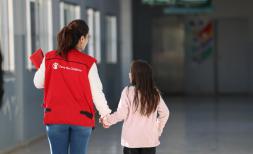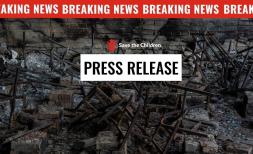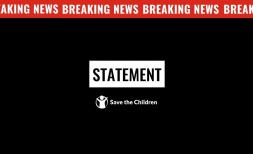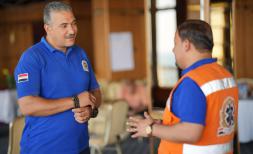Haiti’s class sizes double as mental health crisis worsens among students – Save the Children
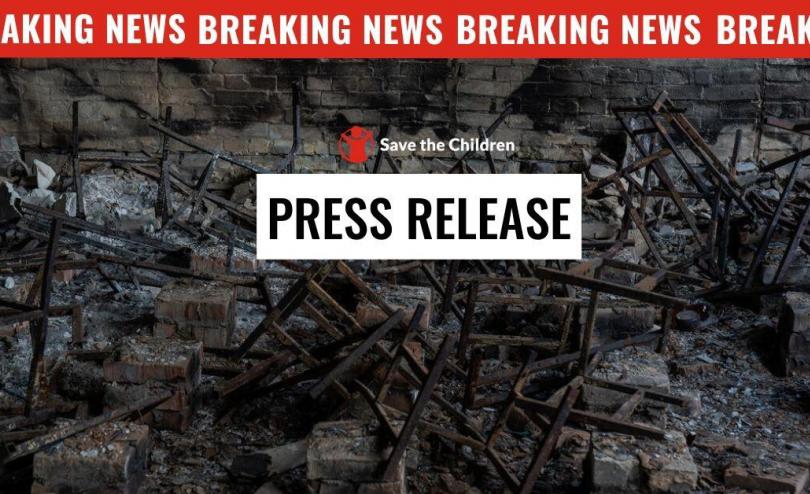
PORT-AU-PRINCE, 26 September 2024 – Haiti’s ongoing violence is set to force thousands of children into overcrowded classrooms when schools reopen next week, with some classes expected to double to 80 students while hundreds of schools remain closed, Save the Children said.
The Haitian government delayed the start of the academic year until 1 October due to the ongoing threat from armed groups, which has displaced about 600,000 people this year – or about 5% of the population. Over the past school year, more than 900 schools temporarily closed, affecting about 200,000 children’s access to education. Many of these schools will likely remain closed next week as they are being used as shelters for displaced families.
In Haiti’s South Department, an influx of displaced families fleeing violence in Port-au-Prince has severely strained an already fragile education system. Save the Children’s local partners in Les Cayes report that internally displaced children will push class sizes to upwards of 80 students—more than double the recommended class size.
Maria Rosette, a school director supported by Save the Children’s local partner ProDev, highlighted the challenges of providing quality education in such overcrowded conditions.
She also noted the psychological impact on displaced students, due to their distressing experiences. Parents and teachers have reported an increase in aggression, withdrawal, and emotional distress among students due to prolonged exposure to armed violence, hunger, and uncertainty.
“What the children should be receiving in terms of quality education they won’t get because there are too many students. Children at the back of the class always tend to suffer the most; they get distracted easily.
“Also, one of the first things I noticed [towards the end of the last academic year] was the mental health and psychosocial support issues that need to be addressed among displaced students. Displaced children witnessed so much when they were in Port-au-Prince, they now suffer from stress and anguish. They are extremely aggressive; they fight and throw rocks at each other – the new arrivals and local children. Many children are not motivated at school. Still, hopefully, as time goes on, they will be more receptive to continuing their education and be able to address and cope with the issues they face.”
As schools begin to reopen, families still face significant challenges in sending their children back into classrooms. Ongoing violence and soaring inflation have impacted families’ ability to afford basic school supplies for their children. Also, some schools that have been used as shelters require extensive cleanup and repairs before they can fully resume educational activities.
For children living in areas with active fighting in Port-au-Prince, starting the new school year next week may not be possible, even if schools reopen. The journey to school in armed group-controlled areas poses significant risks, including being caught in the crossfire and the threat of recruitment into these groups.
Chantal Sylvie Imbeault, Save the Children’s Country Director in Haiti, said:
“The crisis in Haiti is, above all, a children's crisis. Hundreds of thousands of children have been displaced, robbed of their education, and deeply affected by the violence unfolding before their eyes.
“In Port-au-Prince, access to education is severely limited due to school closure in areas controlled by armed groups, attacks on schools, displacement, and widespread violence. Many children can't safely get to school because of the violence surrounding their communities. This means they likely won’t be returning at all to school next week if armed groups continue to wreak havoc across the city.
“A lack of education, overcrowded classrooms, and a growing mental health emergency is threatening to devastate an entire generation—a generation who has already lived through deadly earthquakes, hurricanes, and waves of relentless violence. For many children in Haiti, education is their only hope in an increasingly uncertain world. But that hope is slipping away.”
Save the Children is providing cash assistance for displaced families in the metropolitan area of Port-au-Prince living in schools-turned-shelters to find more dignified housing solutions while helping to free up schools to resume educational activities. The child rights organisation is also working through local partners in Haiti’s West, Grand’Anse and South departments, including in Les Cayes, to provide access to quality education, and psychosocial support to students who need it, while calling for more funding to provide mental health support for children who have been exposed to violence.
Save the Children is calling on the international community to support the government of Haiti in prioritising the reopening of schools while ensuring displaced families currently sheltering in classrooms can afford safe, alternative shelter, and teachers are paid on time.
Save the Children has been working in Haiti since 1978 in both urban and rural communities. It provides cash assistance so families can meet their most urgent needs, delivers health and nutrition support, and supports children´s access to quality education.
ENDS
*******************************************************************************************************************
For further enquiries please contact:
- Samantha Halyk, Senior Global Media Manager, samantha.halyk@savethechildren.org
Our media out of hours (BST) contact is media@savethechildren.org.uk / +44(0)7831 650409
Please also check our Twitter account @Save_GlobalNews for news alerts, quotes, statements and location Vlogs.
